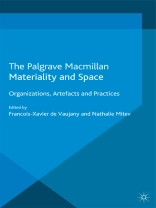Materiality and Space focuses on how organizations and managing are bound with the material forms and spaces through which humans act and interact at work. It concentrates on organizational practices and pulls together three separate domains that are rarely looked at together: sociomateriality, sociology of space, and social studies of technology. The contributions draw on and combine several of these domains, and propose analyses of spaces and materiality in a range of organizational practices such as collaborative workspaces, media work, urban management, e-learning environments, managerial control, mobile lives, institutional routines and professional identity. Theoretical insights are also developed by Pickering on the material world, Lyytinen on affordance, Lorino on architexture and Introna on sociomaterial assemblages in order to delve further into conceptualizing materiality in organizations.
Innehållsförteckning
Introduction: Space in Organizations and Sociomateriality; Francois-Xavier de Vaujany and Nathalie Mitev PART I: MATERIALITY, SPACE AND PRACTICES: DEFINITIONS AND DISCUSSIONS 1. Living in the Material World; Andrew Pickering 2. Towards A Theory Of Affordance Ecologies; Aron Lindberg and Kalle Lyytinen 3. Management Systems as Organizational ’Architextures’; Philippe Lorino 4. Bachelard’s Elements and the Study of Materiality in Organizations; Michèle Charbonneau PART II: SPACE AND MATERIALITY IN EVERYDAY WORK AND CO-WORK PRACTICES 5. The Role of Physical Space in Collaborative Workplaces Hosting Entrepreneurs: The Case of the Beehive in Paris; Julie Fabbri and Florence Charue-Duboc 6. Writing Spaces: Performativity in Media Work; Lotta Häkkinen and Nina Kivinen 7. When Urban Space Becomes Organizational Space: A Space-Based Coordination to Deal with Volatile and Recurring Problems of Urban Incivility; Nathalie Raulet-Croset 8. Constraints and Opportunities: The Use of Space by Employees to Complete their E-Learning Program; Bhumika Gupta and Emmanuel Baudoin PART III: SPACE, MATERIALITY AND MANAGERIAL CONTROL 9. Beyond Panoptic Enclosures?: On the Spatiotemporal Dimension of Organizational Control as Induced by Mobile Information Systems; Aurélie Leclercq-Vandelannoitte 10. To the Victors to the Spoils!: Distributed Agencies, Inhumanities and the Case of Comrade Duch of the Khmer Rouge; Stewart Clegg, Miguel Pina e Cunha and Armenio Rego 11. Controlling Managers’ ’Becoming’: The Practice of Identity Regulation; Stéphan Pezé PART IV: SPACE, MATERIALITY AND INSTITUTIONAL DYNAMICS 12. Mobile Lives and Materialities; John Urry 13. Re-Defining Agency: Indeterminacy and the Role of Extra-Organizational Dynamics in Organizational Routines and Technologies; Aljona Zorina and David Avison 14. Professional Identity [and] Technological Artifacts and Work Practices: The Case of the Train Driver Community of the NRC; Pierre Laniray Conclusion: Back to Longue Duree, Materialism and Management Practices; Nathalie Mitev and Francois-Xavier de Vaujany Epilogue: Performativity and the Becoming of Sociomaterial Assemblages; Lucas D. Introna
Om författaren
David Avison, ESSEC Business School, France Emmanuel Baudoin, University of Paris-Dauphine, France Michèle Charbonneau, l’École nationale d’administration publique, Canada Florence Charue-Duboc, Ecole Polytechnique, France Stewart Clegg, University of Technology, Australia Julie Fabbri Ecole Polytechnique, France Bhumika Gupta, University of Pau, France Lotta Häkkinen, University of Turku, Finland Lucas D. Introna, Lancaster University, UK Nina Kivinen, Åbo Akademi University, Finland Pierre Laniray, University Paris-Dauphine, France Aurélie Leclercq-Vandelannoitte, IESEG School of Management, France Aron Lindberg, Case Western Reserve University, USA Philippe Lorino ESSEC Business School, France Kalle Lyytinen, Case Western Reserve University, USA Stéphan Pezé, University Paris-Dauphine, France Andrew Pickering, University of Exeter, UK Miguel Pina e Cunha, Universidade Nova de Lisboa (Nova), Portugal Nathalie Raulet-Croset, Ecole Polytechnique, France Arménio Rego, Universidade de Aveiro, Portugal John Urry, Lancaster University, UK Aljona Zorina, ESCP Europe, France












